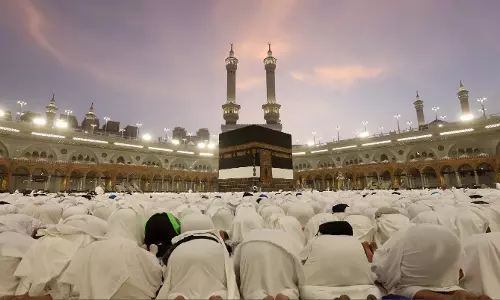
Sonia's Congress stares at rebellion akin to Rajiv, Indira time
text_fieldsNew Delhi: A simple tweet by Congress leader Shashi Tharoor advising his party colleagues to give credit to PM Modi where it is due has snowballed into a massive intra-Congress showdown. So much so that the Kerala unit of the party has asked for his explanation. But this is not an isolated reaction, but part of a growing trend where many who have been traditionally construed to be close to the Gandhis are speaking against the party line.
What the drubbing of the grand old party couldn't ensure, the decimation in 2019 has done -- subtle disagreement to open rebellion.
After a poor show in the 2019 Lok Sabha election, in spite of riding high on the data analytics provided to Rahul Gandhi suggesting the contrary, murmurs started within the Congress critiquing Rahul's leadership qualities. As Rahul resigned and went on a vacation, many leaders followed suit. But August 5 changed everything when the Modi government abrogated Article 370 of the Constitution that gave special status to J&K.
Amid nationwide jubilation and a sense of disbelief, Priyanka Gandhi called it "unconstitutional". Soon Rahul Gandhi criticized the government accusing it of "tearing apart" Jammu and Kashmir. "National integration isn't furthered by unilaterally tearing apart J&K, imprisoning elected representatives and violating our Constitution", he said.
But the mood within his party was one-eighty-degree opposite. Bhupinder Singh Hooda, one of its tallest leaders from Haryana, came out in support of the Union government's decision, unapologetically.
"If the Union government does something right, I appreciate it. When they removed Article 370, a lot of my colleagues opposed it. My party lost its way and is not the Congress that was there before. I will not compromise with anyone when it comes to patriotism and self-respect. On this, I supported (the Centre's stand on) Article 370", said the former Haryana CM in one of his harshest criticisms of the Congress.
His son Deepender Hooda, known be close to Rahul Gandhi, tweeted: "My personal view is that there isn't a need to have Article 370 in the 21st century." Another young face of the party Jaiveer Shergill took to Twitter to state, "My Personal Point of View: I support abrogation of Art 370 (as opening words say it's temporary)..."
What left the Congress red-faced was its chief whip Bhubaneshwar Kalita resigning owing to his party's stand on the issue. He issued a statement saying, "The Congress has asked me to issue a whip on the Kashmir issue. But the truth is that the mood of the nation has completely changed and this whip is against the public sentiment across the country...It seems the Congress is committing suicide with this ideology and I don't want to be part of this."
Increasingly, the sense was of a rebellion. A rebellion that was akin to the one when Congress faced a virtual split in 1969. Then Congress President, S. Nijalingappa had expelled Indira Gandhi from the party for "fostering a cult of personality". She had proposed N. Sanjeeva Reddy's name for presidentship and had asked Congressmen to "vote according to their conscience". But it was V.V. Giri, the rebel Congress candidate, who had won. The rebellion was loud and clear.
Leaders in Congress like Pawan Khera cite "history of voicing their opinions" to legitimize the current situation that Congress is facing. "Yes there are times when the leadership expects them to toe a particular line, which is a party line. But that does not mean, you know, there's no democracy in our... there's lot of democracy in our party. Thats the difference between us and the BJP".
But what is being accepted as a dissent today was brushed aside by the party as aberrations till a few days back. The Congress would argue, abrogation of Article 370 is an emotional matter and hence the difference of opinion which may not be very nuanced. They would insist it should not be seen as rebellion.
But when Jairam Ramesh recently said demonizing Narendra Modi hasn't helped Congress in any way, it opened up a Pandora's Box. He also praised the work done by the Modi government. Ramesh said it was due to Modi's activities between 2014 and 2019 that more than 30% of the electorate voted for the BJP this year.
Soon others joined in. Party spokesperson Abhishek Manu Singhvi said, "Always said demonizing Modi wrong. Not only is he PM of the nation, a one-way opposition actually helps him. Acts are always good, bad & indifferent - they must be judged issue-wise and not person-wise. Certainly, Ujjwala scheme is only one among other good deeds."
Then joined in Shashi Tharoor, the Kerala MP. He too echoed the same sentiment. Clearly, there is no emotional issue like Article 370 being discussed, as Congress would have argued. Yet, many senior Congressmen rallied against their party and more importantly around the Prime Minister.
A senior Congress leaders while speaking to IANS on condition of anonymity said an interesting thing. He said leaders reflect the views of society and those Congressmen who have spoken out recently have reflected the society's overarching views.
Is that a tacit acceptance of the fact that the grand old party has lost touch with popular beliefs of the society. Pranab Mukherjee, a diehard Congressman left the party when Rajiv Gandhi was anointed. Does the present situation give the Congress a sense of deja vu?
But party spokesperson Sanjay Jha will play it down by drawing a parallel between BJP and Congress. He sys the reason there is no rebellion or dissent in BJP is because "there is a fear psychosis prevalent". He cites inner-party democracy in Congress to explain the present situation where leaders have voiced their dissent.
But when the dissent grows with each passing week, with some of it coming from as senior a leader as a former Chief Minister who accused his own party of going astray, hardly can it be labelled as Congress allowing its members to exercise "inner-party democracy".
If this is not rebellion, what is?






















_5.jpg)